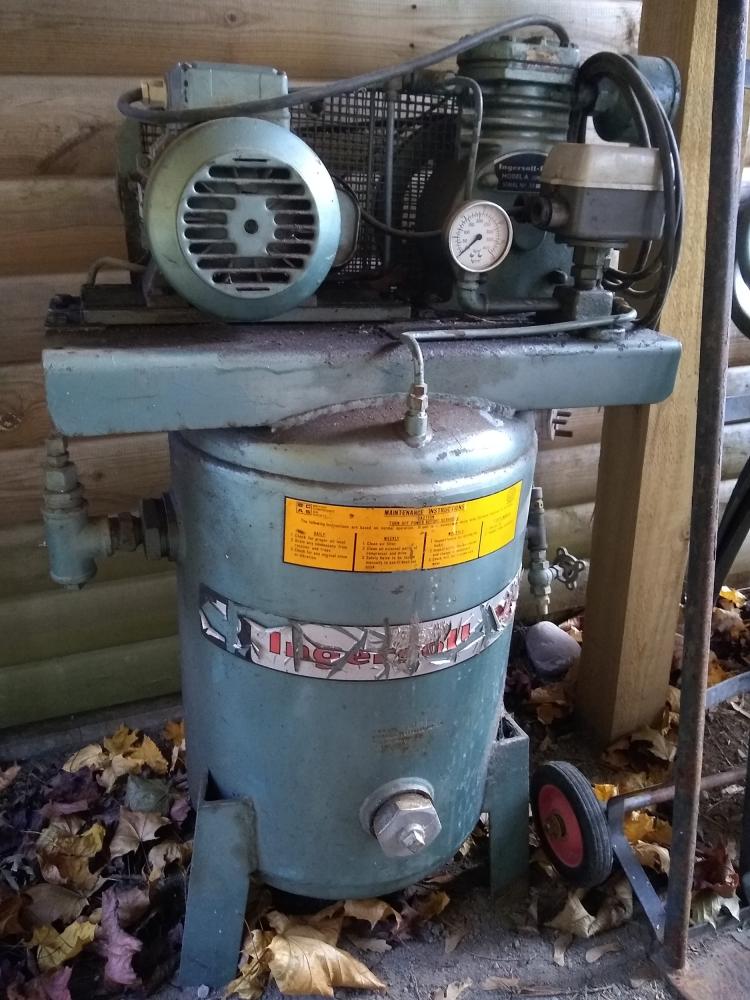Joined: Oct 2017 Posts: 1,508 Threads: 54
Reputation:
8
For start I'd remove that large plug near the base and see how much corrosion there is inside.
Joined: Aug 2017 Posts: 774 Threads: 33
Reputation:
16
Location: Beautiful Northumberland
Car type: 1933 RP Saloon (aka Mildred)
And perhaps stating the obvious but you can then pressurise it on a long extension lead behind a concrete wall and leave it for a while to see if it holds pressure. It will show leaks but not of course the potential for catastrophic failing joints. I guess a joint is more likely to pop off rather than a main weld joint failing and it's not exactly going to go off like a bomb, but your ears could well take a serious hit. Alternatively £250 will keep you safer...
Enjoy yourself, it's later than you think!
Joined: Aug 2017 Posts: 869 Threads: 75
Reputation:
10
Good idea Dave. I have an endoscope attachment for a phone on my Christmas list so I can try it out on this!
It's not so much tight-fistedness that stops me from simply buying another one, but the fact that it is very very quiet in operation. I had wondered about replacing the tank but I have a feeling that a new tank might be thinner /less bulky and therefore noisier.
Joined: Aug 2017 Posts: 1,022 Threads: 54
Reputation:
5
Location: The delightful town of Knaresborough, North Yorkshire
Peter, I have often thought the same about my 45 year old compressor. The best is to get the receiver tank pressure tested. I believe that involves applying a much higher pressure, but using water, not air.
Joined: Aug 2017 Posts: 3,395 Threads: 106
Reputation:
28
Location: Darkest Bedfordshire
I wouldn't want to be in a room with it when it failed.
There are places which test pressure vessels (there have to be, as there is a mandatory schedule of maintenance for larger / industrial ones). I'm sure if you Google it you'll find someone nearby. More than likely they will take one look at its age, or the slightest trace of corrosion, and condemn it. People find it cheaper to buy a new compressor every couple of years than to shell out for the inspections. On the plus side, if it's a few years old it may well be made of heavier gauge steel than those on the market today.
I don't know if your premises allow for it, but there's a lot to be said for building a "compressor house" on the back of your workshop. The noise & clutter is then taken out of your workspace. And if you do wish to continue using this device, if it does go 'bang' it will not be in the same room as you.
Joined: Aug 2017 Posts: 639 Threads: 29
Reputation:
7
Saw a picture of one on the internet which had split open but my opinion for what it’s worth it’s likely to pin hole with rust first.More chance it would be at the bottom where the water sits when not used.
My old compressor tank was dated 1937,an old castrol compressor,well tank anyway and I’d used it till about 20 years ago when I bought a bigger one.
Joined: Aug 2017 Posts: 927 Threads: 22
Reputation:
10
Location: Near Cambridge, UK
Car type: 1928 tourer (mag type), short chassis Gould Ulster
The comment about testing with water makes a lot of sense, because failure in that situation will not send sections of tank in all directions. I would be inclined to pump up with water to twice the maximum pressure you use, which should be controlled by the safety valve and the pressure switch. If the tank survives without leaks I reckon you are probably safe for another five years. I would add that I am not an expert, but long time ago in my working life we used to test steam and hydraulic pipe systems usually at up to twice normal working pressure, the final check being that the pressure did not decay for a period after the test was applied.






 ) As per a previous post pinholes from rust is a much more likely scenario. In this case it either won't fill - or will constantly be running. I had this just the other day - I had forgotten to close the drain plug and it just ran on and on until I realized it.
) As per a previous post pinholes from rust is a much more likely scenario. In this case it either won't fill - or will constantly be running. I had this just the other day - I had forgotten to close the drain plug and it just ran on and on until I realized it.